How Pakistan reacted over war criminals’ punishment
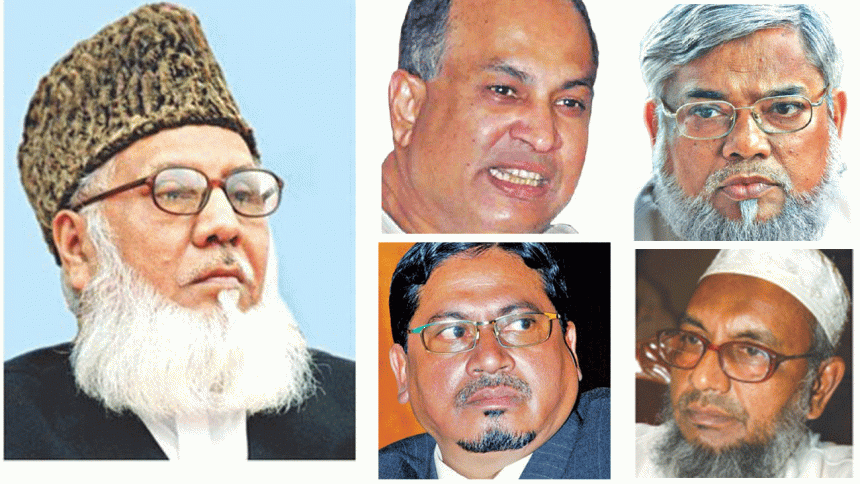
Every time an execution of a war criminal took place in Bangladesh, the Pakistan government came up with "questionable comments" on the issue, which is Bangladesh's internal matter.
With procedures underway for the execution of court verdict on top war criminal and Jamaat-e-Islami leader Motiur Rahman Nizami, the country once again issued a statement that earned ire from the Bangladesh authorities.
READ MORE: War trial: Death warrant issued for Nizami
A day after Supreme Court dismissed Nizami's review plea against death penalty, Pakistan Foreign Office expressed concern, terming the trials "controversial".
This is not the first time the country "meddled" in Bangladesh's internal affairs relating to the trial of its citizens who were involved in crimes against humanity during the 1971 Liberation War.
Soon after the executions of Abdul Quader Mollah on December 14, 2013, Pakistan issued the following statement.
Situation Bangladesh
(2013-12-13)
As a friendly country and fellow SAARC member state, we are closely following the political developments as they unfold inside Bangladesh.
While it is not Pakistan's policy to interfere in the affairs of any country, we have noted the concerns raised by the international community and human rights organizations on the way recent trials have been conducted which have added to the current instability in Bangladesh.
We wish the brotherly people of Bangladesh well and hope that spirit of reconciliation and an atmosphere, free of violence, will prevail.
Islamabad
December 13, 2013
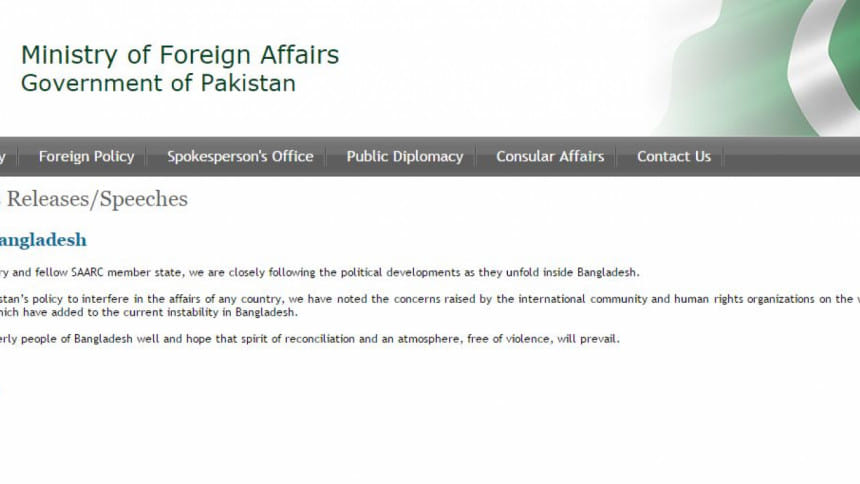
During the execution of Muhammad Kamaruzzaman on April 11, 2015, Pakistan issued the following statement.
READ MORE: LIVE: Execution of War Criminal Kamaruzzaman
Reaction to the Execution of the Jamaat-e-Islami Leader in Bangladesh
(2015-04-11)
We have taken note of the execution of the Bangladesh Jamaat-e-Islami leader Mr. Muhammad Kamaruzzaman. As stated earlier, we have also noted the comments by the international community on the ongoing trials in Bangladesh. We are carefully monitoring the situation with regard to internal developments in that country.
As a fellow Muslim country and SAARC member, Pakistan has mutually beneficial relations with the people of Bangladesh. Our people struggled together for independence from the colonial rule. In our view, values of reconciliation, harmony and forward looking approach should guide us towards the future of peace and Prosperity. Pakistan wishes progress, harmony and prosperity for the people of Bangladesh.
Islamabad
11 April, 2015
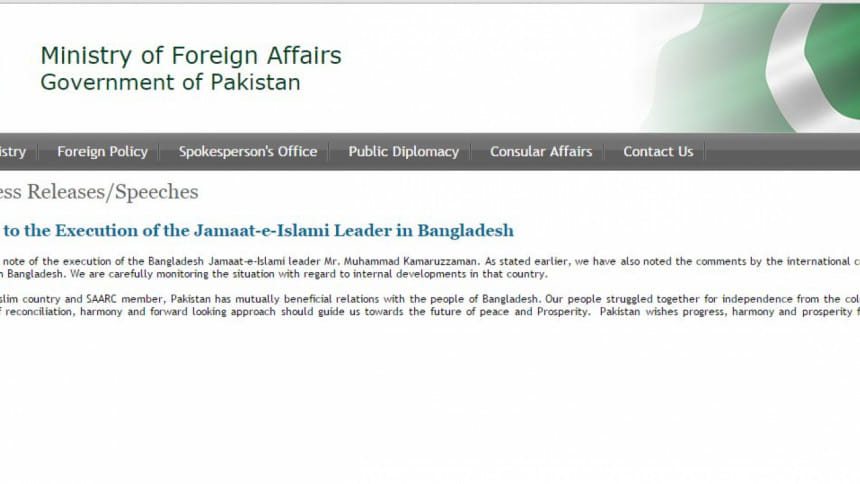
After war criminals Salauddin Quader Chowdhury and Ali Ahsan Mohammad Mojaheed were executed in the early hours of November 22 last year, Pakistan gave the following statement.
READ MORE: Pakistan 'deeply' perturbed over executions in Bangladesh
Remarks by the Spokesperson on the execution of Bangladesh nationalist Party leader, Salauddin Quadir Chowdhury and Mr Ali Ahsan Mojaheed
(2015-11-22)
We have noted with deep concern and anguish the unfortunate executions of the Bangladesh National Party Leader, Mr. Salauddin Quadir Chowdhury and Mr Ali Ahsan Mojaheed. Pakistan is deeply disturbed at this development.
As emphasized earlier, we have also been noting the reaction of the international community on the flawed trials in Bangladesh related to events of 1971.
There is a need for reconciliation in Bangladesh in accordance with the spirit of Pakistan, India, Bangladesh Agreement of 9th April 1974. The Agreement calls for a forward looking approach in matters relating to 1971. This would foster goodwill and harmony.
Islamabad
22 November 2015
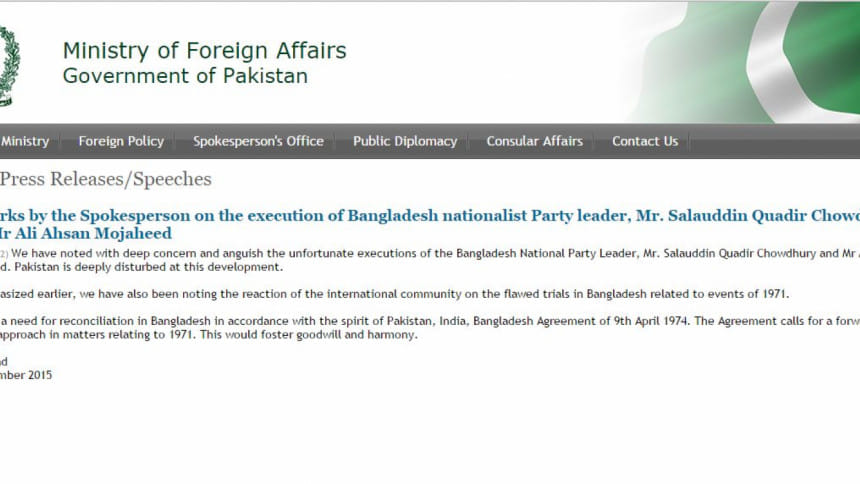
In the latest statement regarding Nizami, the country says.
Pakistan expresses deep concern, anguish on dismissal of Niazami's review petition in Bangladesh
(2016-05-06)
We have noted with deep concern and anguish the dismissal of the review application on the death sentence, by the Supreme Court of Bangladesh, for Mr. Motiur Rahman Niazami the leader of Jamaat-e-Islami.
We have also been following the reaction of the international community and human rights organizations to the controversial trials in Bangladesh, related to events of 1971.
There is a need for reconciliation in Bangladesh in accordance with the spirit of Tripartite Agreement of April 1974 which calls for a forward looking approach in matters relating to the events of 1971.
Islamabad
6 May 2016
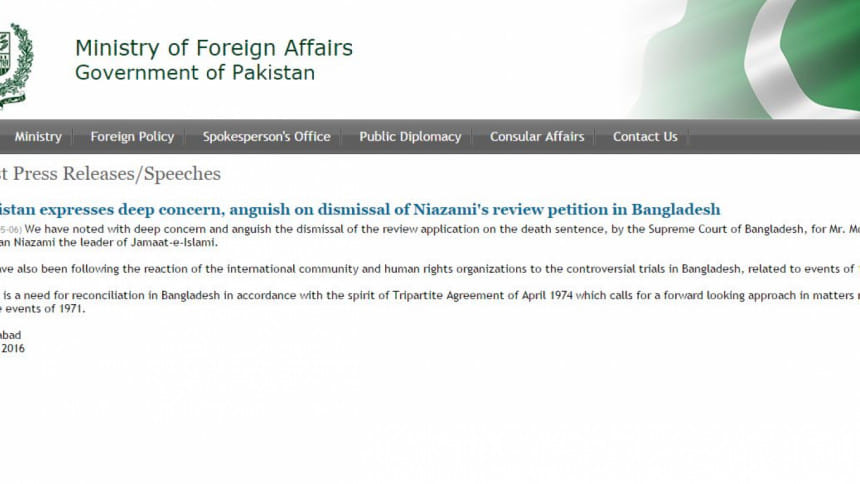

 For all latest news, follow The Daily Star's Google News channel.
For all latest news, follow The Daily Star's Google News channel. 

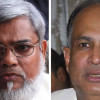
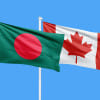





Comments